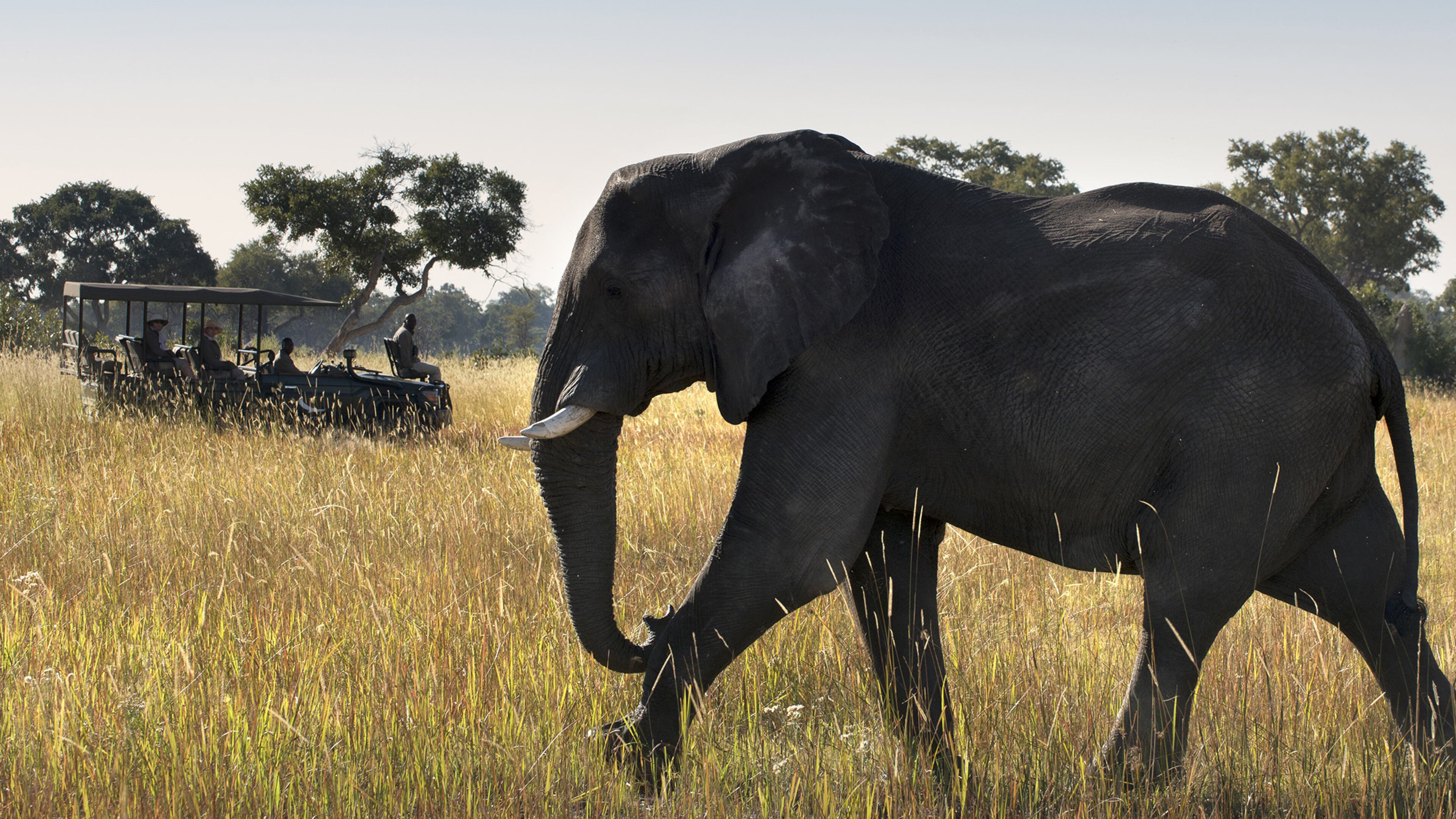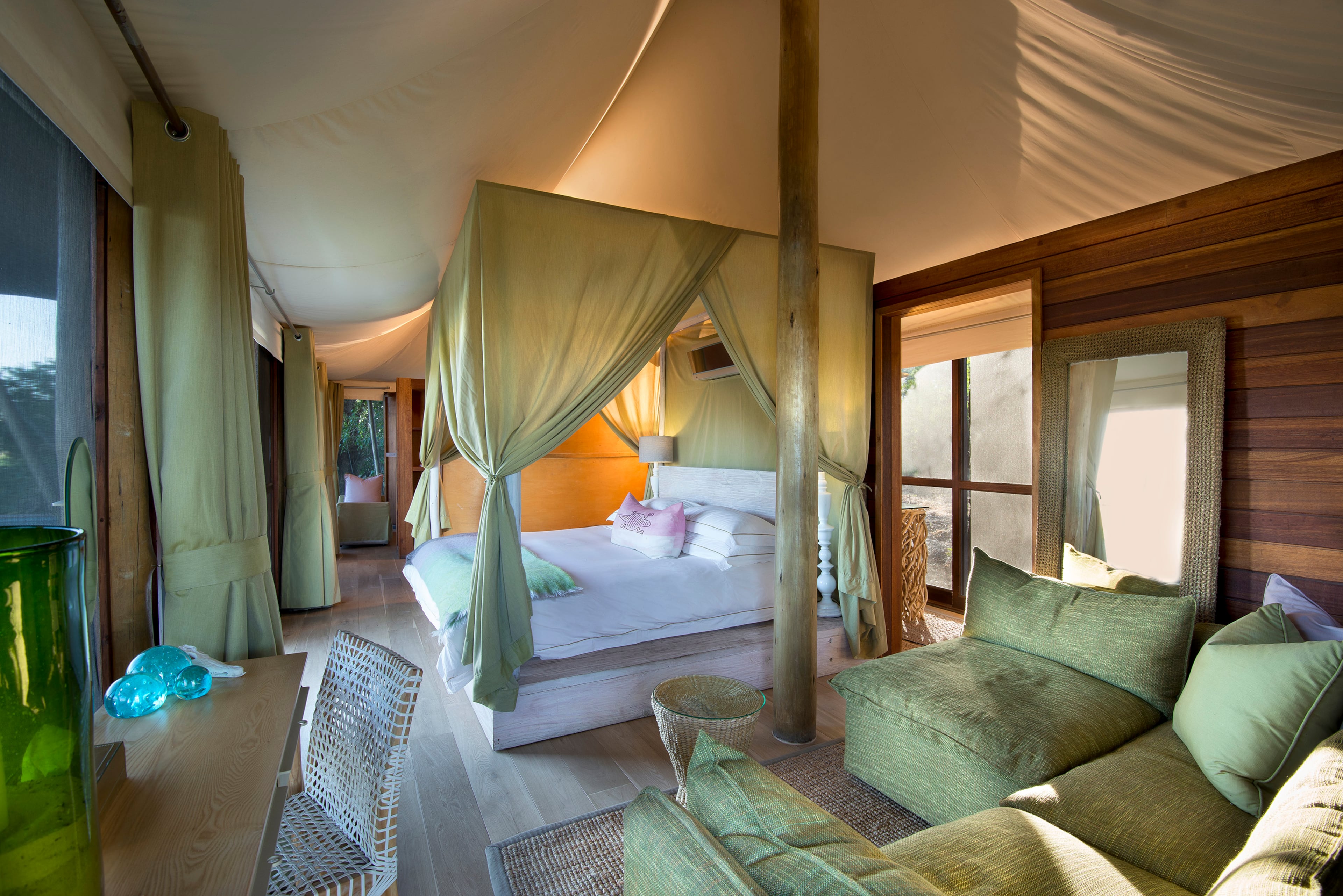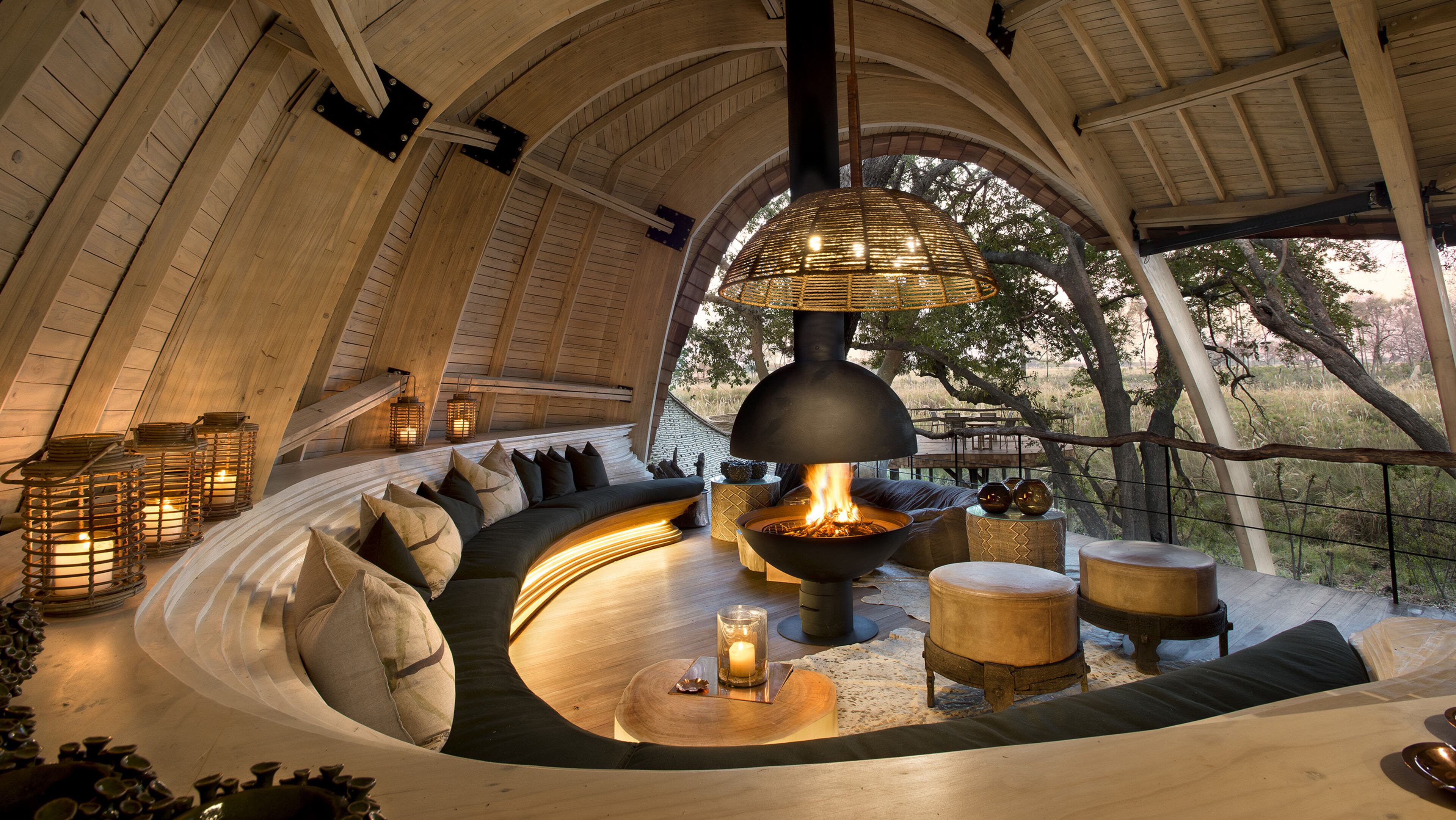Botswana safari is an eye-opener

We were eyeing one another. I didn’t blink. Wrong move, Elicious said. Leopards leap at stares. Good to know, I said somewhat annoyed at myself, after all as former director of program acquisitions for Animal Planet and Discovery Channel in Canada, I thought I had learned the do’s and don’ts of animal “etiquette.” Not so! Watching these magnificent beasts on TV, film or in a zoo, is light years away from seeing them in the wild. My seat in an open safari vehicle beats the couch at home, hands down. Eyes somewhat averted, my guide and I watched in silence as the glint of the evening sun turned the leopard’s eyes to a burnished amber and his muscular body to rippling silk. He scrutinized us warily, but did not move.
It was my first ever safari, and Elicious, my guide, had spotted the leopard in the Okavango Delta (an UNESCO World Heritage Site) of the landlocked southern African country, Botswana. One of the world’s largest inland deltas, it’s shaped like a hand generously opening to long narrow fingers of water nourishing the vast and varied ecosystem.
Here is where andBeyond, an international luxury experiential travel company, owns several safari camps and lodges, as well as 25 others throughout Africa. Their motto — “Take care of the land, take care of the animals, and take care of the people” — was evident during my six-day safari in three of andBeyond’s five-star accommodations in Okavango. AndBeyond is renowned for training its guides and trackers. Elicious was the first of six I was fortunate to travel with.
Backtracking a bit: I flew from Johannesburg to the city of Maun in northwest Botswana. From there, despite being a white-knuckle flyer, I boarded a seven-seater plane that landed 15 minutes later on a landing strip in the bush, where we were met by warthogs, baboons and our charming safari vehicle driver. For 45 minutes we rumbled along past the termite mounds (towering, white sculptures), a dazzle of zebras, impalas, kudus and giraffes. An elephant glided by, silently, as if he were on a pulley — his grace belying his size. The pungent smell of sage permeated the air and several of the 450 bird species in Botswana displayed their vocal colors. (One species sounded like castanets on steroids).
All this before we even arrived at the canal for our short boat ride to Xaranna Okavango Delta Camp. As we approached, motoring through swathes of water lilies and within earshot of the deep grunts of the hippos, the genuinely warm-hearted Batswana staff, singing and dancing on the wharf, signaled our arrival at this secluded oasis.
I was met by my butler, Lesedi, who escorted me along a winding path to my suite (one of only nine). They are well spaced, a sense of complete privacy prevails, but so too the ever present realization that in this unprotected camp wild animals have the right of way. Walking to and from my suite to the main lodge took a bit of courage on my part, and Lesedi’s philosophy (“Everything we want is on the other side of fear”) helped, although so did the fact that he accompanied me in the early mornings and evenings, as were all guests with their respective butlers.

The three andBeyond properties were designed by Fox Browne Creative from South Africa, each imprinted with its own signature theme. Xaranna: soft palette of pink, khaki and white enveloped in natural wood and canvas riffed on the water lilies, reeds and hippos. Kudum Lodge, a boat ride away, Xaranna’s male counterpart, with its chocolate and ebony hues reminisced with playful recycling touches in repurposed tires, old Mokoro canoes and liberal use of rough-hewn chunky timber.
After an evening safari, and dinner at Xaranna, I returned to my suite to find the bathtub foaming with bubbles and aromatic scents; at Kudum on another such evening, dozens of votive candles lit a path from the front door to the bathtub, this time with a bottle of Amarula (a cream liquor from South Africa) seductively leaning in its own bath of ice cubes. I barely was able to get out of the tub after the heat of the water and the intoxicating drink!
Mornings began with a gentle knock on my door and a tray laden with hot tea with cookies, at 5:30 a.m. A half hour later, again a knock at the door and out I go into the darkness to breakfast: porridge, fresh fruit, yogurt, and fellow guests gathered around the Boma (meeting place) for sustenance before our five-hour safari outing. The rising sun illuminated the paths where the tracker and guide scanned for visible signs of wildlife: foot imprints, insect tracks (scorpions cross only at night, for example), which way the wind is moving, the smell of urine, feces droppings … all signs observed to determine which animals are around and where. This all paid off big time when we came upon a den of eight lion cubs waiting for their parents to return. Priceless!
About midway through the morning, we stopped for a snack set up under a tree. Out came the metal table, tablecloth, hot tea, coffee, cold drinks and bowls filled with candied ginger, cheese, crackers and various sweets. No animals decided to join us, mercifully. Returning home, a herd of elephants entertained us with a mud bath roll, the little ones so endearingly protected by the matriarch and “aunties.” During an afternoon siesta at andBeyond Kudum, I was awakened from my snooze by rustling sounds just beyond the screened-in porch a few meters from my bed. Two bull elephants decided to grab a little acacia tree snack. Transfixed, I watched them tussle with one another while intermittently tucking the leaves of their dexterous trunks into their mouths.
The tiniest creatures must be given their due, as well. One late afternoon, I settled deep down into a Mokoro (a traditional dugout canoe) while the Venetian gondolier-style navigator plied through the tall papyrus and cottonwool grasses as the breeze and bird calls serenaded. Webs of gossamer were spun by black spiders and the blue emperor dragonflies jetted across the water lilies. I was hoping to see the ears and eyes of a hippo protruding above the water’s surface, but no luck this time.
Leaving that part of the Delta behind, I flew to my last “home” in Botswana, andBeyond’s Sandibe Okavango Safari Lodge tucked away in a forest canopy of wild palms and fig trees. This time the Fox Browne design team created a mammoth replica of the most trafficked mammal in the world: the Pangolin. (The animal’s keratin-rich scales are both its protector — even the teeth of a lion can’t penetrate when it rolls itself into a tight ball — and yet that same keratin is like catnip for the rapacious consumption for medicinal herbs in some Asian countries). Maple and pine culled from Canadian forests soar over the guests in such a way that creates a feeling of being inside the very skeleton of the Pangolin. The theme is in keeping with andBeyond’s impressive conservation projects for the endangered rhinos and the company’s involvement in building schools for children.

Each of the 12 suites resembled baby Pangolins perched high above vast floodplains. A more modern riff on the traditional safari camp look greeted me: copper wash basins, metal wood burning stove, cathedral-like indoor shower made from material mimicking cement, and floor-to-ceiling windows offering a panoramic view of the scenery. The bed was perched on a wooden platform facing screens that opened to patios centered by a circular plunge pool. Again, as in Xaranna and Kudum, the dining experience was truly imaginative. I particularly enjoyed the interactive kitchen area and the Boma fireside dinners.
My last day at Sandibe was somewhat delayed by a rollicking, screaming fight among a few members of a troop of baboons, just at the foot of my stairs. I knew I wouldn’t win in this match, so I just stood back and savored the scene. It was difficult to leave and easy to love my privileged andBeyond trip. It spoke to the beauty of the land, the diversity of the animals, the responsibility of conservation, and the endearing nature and spirit of the Batswana

